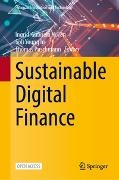Ulteriori informazioni
Digital innovation is significantly reshaping the financial services landscape, pioneering new avenues for sustainable access, distribution, and management of financial resources. A myriad of real-world applications, such as enabling digital supply chain finance across agricultural and fashion value chains, and leveraging digital currencies to fuel smart meters in schools in developing nations, are continually emerging. Moreover, the advent of digital investment marketplaces, crowdfunding platforms, token-based financing, new payment infrastructures, digital wallets for waste management, and blockchain-based autonomous decentralized organizations, among others, underline the expansive and inclusive capabilities of digital finance. The potential of digital innovation extends far beyond our current imaginings. In this vein, this book seeks to present visionary, yet practical, perspectives that employ innovative technologies to address overarching sustainability challenges.
Thisis an open access book.
Sommario
Sustainable digital finance: Where we are now and where we need to be.- The role of blockchain and governance in Africa´s economic development.- Sustainable digital finance in central banking.- Why financial access isn´t enough.- Rebound effect and sustainable digital finance.- Tokenization of voluntary carbon markets and its potential for financial inclusion.- Legal foundations of Green FinTech: Paving the Way for Sustainable Finance.- Carbon, meet silicon.- When the lights go out-remote lockout technology in sustainable pay-as-you-go products.- Enhancing digital sustainable finance: digital solutions to mobilise capital, assess environmental risks and enhance financial inclusion.- Taxing crypto-assets to fund the sustainable development goals: Improving evaluation of crypto functional substitute risks.- Navigating the dual realities of digital finance in Indonesia: Assessing sustainable strategies for access and consumer protection since 2016.- Digital payments–opportunities and challenges for African tax administrations.- Vision for the future of financial consumer protection in LMICS.- Understanding Informality and Mutuality in Kenya´s Digital Finance Landscape.- Enabling financial access via blockchain: The potential for decentralized finance to address inclusion challenges in Latin America.- Digital financial inclusion for sustainable development in Brazil: Unfolding the positive and negative paths.- Mobile money: the democratizing force of financial inclusion.- Cashing in on cashless: Different pathways to cashless payments in the Global South.- Digital cross-border payment technologies in high-risk fragile, conflict and vulnerable contexts.- Sustainable digital finance in Africa: Leveraging innovative solutions to address fragility and build resilience.- Financial inclusion and cybersecurity: the role of governance in conflict states in Africa.- The digital transformation of international financial security.- Digital public infrastructure for our new era.- Harness the power of AI for sustainable finance.- Battening down the hatches: How financial inclusion can make the poor more climate resilient.- India`s DPI Experiment and Digital Finance Revolution.- Sustainable Finance and Big Data Collection – On the Nexus between Sustainability, Finance and Digitalization.
Info autore
Ingrid-Gabriela Hoven is Managing Director of Deutsche Gesellschaft für Internationale Zusammenarbeit (GIZ) GmbH since October 2020. Ms. Hoven is a development economist with more than 30 years of international experience focusing strongly on sustainability and climate issues. From 2010 to 2014, she served as World Bank Group Executive Director representing Germany.
Prof. Soh Young In is an Assistant Professor in the Department of Civil and Environmental Engineering and an Affiliate Faculty of the Graduate School of Green Growth and Sustainability. Her research interest is demonstrating environmental, social, and economic incentives related to low-carbon transition and implementing sustainable and resilient infrastructure systems through behavior change of various stakeholders.
Prof. Dr. Thomas Puschmann is Founder and Executive Director of the Global Center for Sustainable Digital Finance at Stanford University and the University of Zurich. In addition, he was Founder and Director of one of the first FinTech research labs worldwide, the Swiss FinTech Innovation Lab at the University of Zurich, Professor at the University of the Fraser Valley in Canada, Co-Founder of the Association Swiss FinTech Innovations, Co- Founder of the Swiss Green FinTech Network, Co-Founder of Extreme Tech Challenge Switzerland and Member of the Swiss Innovation Council Innosuisse.
Riassunto
Digital innovation is significantly reshaping the financial services landscape, pioneering new avenues for sustainable access, distribution, and management of financial resources. A myriad of real-world applications, such as enabling digital supply chain finance across agricultural and fashion value chains, and leveraging digital currencies to fuel smart meters in schools in developing nations, are continually emerging. Moreover, the advent of digital investment marketplaces, crowdfunding platforms, token-based financing, new payment infrastructures, digital wallets for waste management, and blockchain-based autonomous decentralized organizations, among others, underline the expansive and inclusive capabilities of digital finance. The potential of digital innovation extends far beyond our current imaginings. In this vein, this book seeks to present visionary, yet practical, perspectives that employ innovative technologies to address overarching sustainability challenges.
Thisis an open access book.

